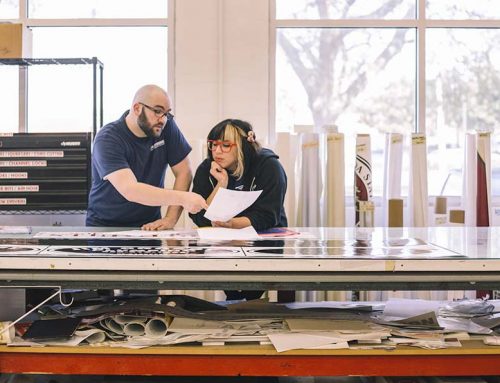The U.S. Small Business Administration (SBA) says that eligibility for their loans is “based on what a business does to receive its income, the character of its ownership, and where the business operates.” But that doesn’t clearly explain how to qualify for a commercial real estate loan. What’s more, SBA loans are not the only option available.
In this post, we’ll delve deeper into what steps small business owners can take to qualify for loans. We’ll also cover various borrowing options.

How to Qualify for a Commercial Real Estate Loan Checklist
Before You Get Started
There’s no point in applying for a commercial real estate loan if you don’t meet certain common requirements:
- Most lenders will require that you have been in business for at least one year, if not two. If this isn’t the case for you, you’ll need to narrow your search to lenders providing funding to early-stage startups.
- Lenders also typically set a cap on number of employees or revenue. This helps define and qualify a business as a small business. Depending on industry and lender, this cap can range anywhere from 250 employees to 1,500, and from $750,000 to $38.5 million in average annual receipts. Look up your industry and make sure your business hasn’t already grown too big.
- You’ll need a good credit score. Commercial real estate loan providers will want to know your personal credit score and business credit score. Traditional bank loans and SBA loans in particular require high credit scores, while other lenders may be more lenient. If your credit score is low, check it for errors and dispute it if you find any. It is possible to get your score modified before you start applying for loans.

Narrow Down Funding Details with a Business Plan
Before applying for any type of loan, it’s important to be clear about exactly what you need the funding for, how much you need, and how you’ll pay it back. If you don’t have a business plan already, this is the perfect time to make one. Small business loan providers will likely ask for a business plan as part of the application process. Creating one now will only help.
Writing a strong business plan doesn’t have to be difficult. Lenders simply want to see how you plan to be profitable and ensure they’ll be paid back for the loan. To do this, your business plan should include current and projected financials, cash flow, and business expenses. It should demonstrate the ability to make loan payments given all these factors.
A business plan should distinctly lay out what funding will be used for. This is helpful both for you and lenders. Depending on what the funds are used for, different loans are available. From commercial real estate to cash advances, and equipment loans to crowdfunding, there’s a loan for every need.
Once you have an understanding of how much funding you need and how you’ll pay it back, it’s time to start gathering documents, searching, and applying.

Typical Commercial Real Estate Loan Qualifications and Considerations
Aside from a good credit score and a plan to pay off the loan, lenders tend to look for a net operating income that is greater than 125% of a business’ expenses. They’ll also look at your personal debt-to-income ratio, typically preferring borrowers with a ratio of less than 50%. A balance sheet showing business assets, liabilities, and equity can help build lender confidence.
Small business loans often also require healthy cash flow. If your business is struggling with cash flow due to unpaid invoices, consider invoice factoring or accounts receivable financing, where a third-party lender buys unpaid invoices to help a business continue operating.
Depending on your financial history and business track record, lenders may require collateral. This can take the form of commercial real estate, inventory, or equipment. If a borrower fails to make payments, collateral can be seized by the lender. In the case of a business owner without sufficient collateral, or one who doesn’t want to put up any business assets, some lenders may accept a personal guarantee. A personal guarantee puts a business owner’s personal credit score and assets on the line.
SBA loans require both collateral and a personal guarantee from business owners. For borrowers lacking collateral and wary of personal guarantees, unsecured business loans are another option to consider.

Potential Roadblocks to Qualifying for a Commercial Real Estate Loan
It’s possible to do everything right, and still come up short. In the case of commercial real estate loans, there are a few things that can put a hiccup in the qualification process.
Bankruptcies, for example, don’t look good to a lender. The same goes for other past financial delinquencies. It may take a little extra effort to convince loan providers that you can appropriately manage debt if these are on your record.
SBA loans have additional requirements, such as being current on all government loans with no past defaults. This includes federal student loans and government-backed mortgages. Online commercial real estate loans may be more forgiving of bankruptcy. These loans, however, are often more expensive.
Some lenders can be picky about the types of business they will lend to. Socially stigmatized businesses, such as those operating in the sale of alcohol, marijuana, or sexual health products and services, receive higher rates of loan application rejection. If this applies to your business, you may need to do a little extra research to find lenders known for supporting these industries.

Qualify for a Commercial Real Estate Loan with PRC Commercial Real Estate Loans
Reach out to our financial experts at PRC Commercial Real Estate Loans today to get qualified for all government secured loans from $2-$200 million. We can help small business owners nationwide with SBA loans for all commercial real estate. The PRC Small Business Lending Group specializes in helping small business owners own real estate without sacrificing the things that are most important to them. Call 877-350-9416 to speak to a financial expert.





CONNECT